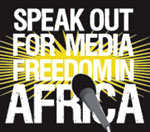Ethiopia should allow German broadcasts - CPJ

The management of Deutsche Welle told CPJ that the International Broadcasting Bureau, which provides non-military broadcasters with transmission and technical support, confirmed interference on the station's shortwave signal to Ethiopia on April 3, 6 and 7. In a press statement, the station's management accused Ethiopian authorities of involvement in the jamming in response to Amharic-language news and coverage critical of the government. No other foreign broadcasters were believed to have been disrupted.
On April 3, for instance, the station aired a popular discussion program in which participants claimed the Ethiopian government feared a popular uprising similar to those witnessed in North Africa, the station's management said. The station also covered a Human Rights Watch statement criticising the government for the arrests of more than 200 ethnic Oromo opposition members. Local journalists told CPJ that they believed Deutsche Welle signals would be blocked again during a planned civil society protest on May 28 called Beka, meaning "enough."
Government spokesman Bereket Simon told Reuters that the government had not jammed the Deutsche Welle service. The station had a very low listenership, Simon said, and would not be worth jamming. The management of Deutche Welle disputed this and cited a 2009 study that said the station has the highest foreign radio listenership in the country, reaching 3 million to 4 million people a day.
"Ethiopian authorities have jammed international broadcasters in the past during politically sensitive moments," said CPJ East Africa consultant Tom Rhodes. "We call on them now to ensure that all foreign broadcasts can be heard."
Individual broadcasters were jammed in Ethiopia during the May 2010 elections, according to CPJ research. Prime Minister Meles Zenawi ordered the jamming of the US-backed broadcaster Voice of America two months before the elections last year.
Article published courtesy of CPJ





















